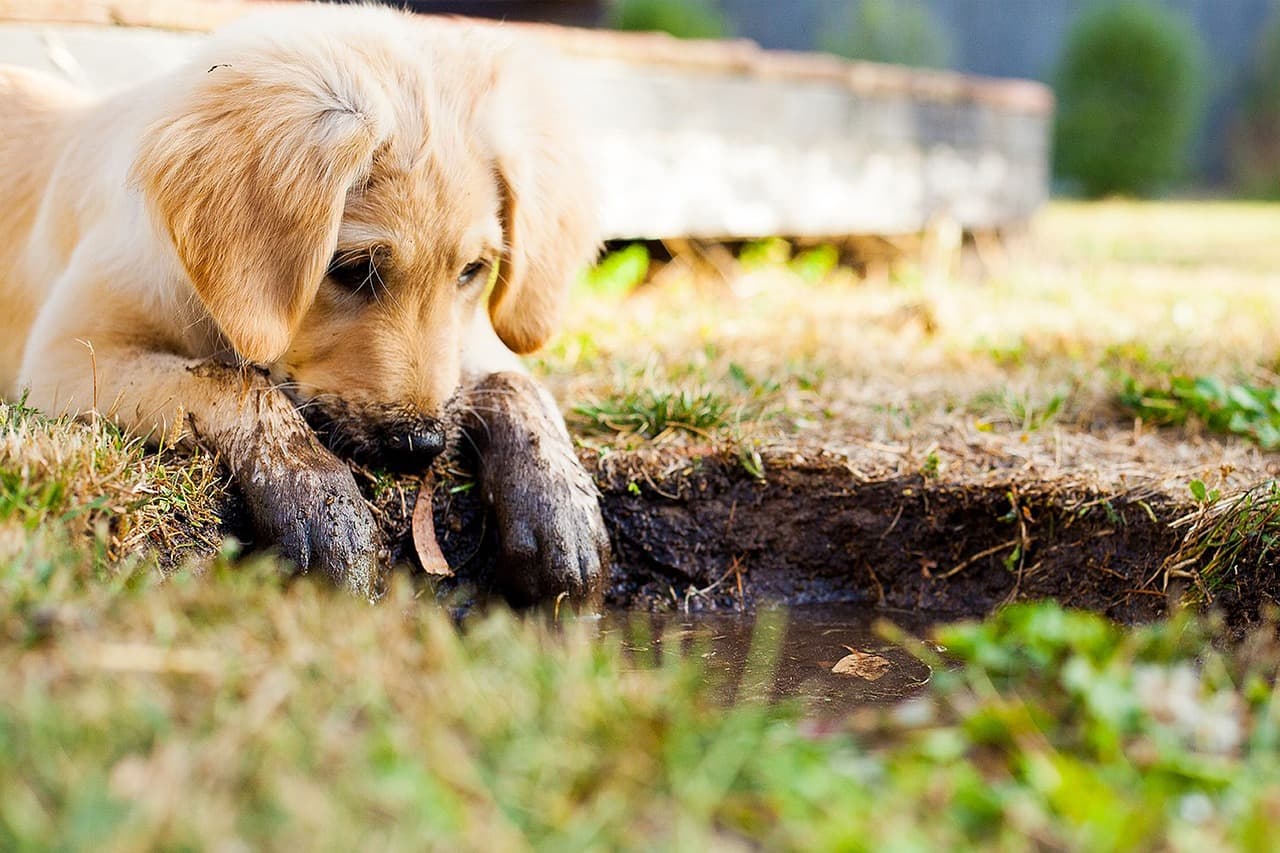As a dog owner, you must already know that these pets are pretty curious, and some of their exploratory behaviors can be of great concern – in this case, dogs eating dirt. Eating dirt, a phenomenon called geophagia, is not a healthy behavior and as a pet owner, you might want to take this issue seriously.
Why Does My Dog Eat Dirt?
Pooches eat dirt for many reasons, ranging from stress and boredom to something more serious, like a medical condition. So, if you find your dog eating dirt, it could be due to any of the following issues.
Nutritional
Eating dirt could be a sign that your pup lacks proper nutrition. You must know that some canine diets may not necessarily contain all the required minerals for your dog to stay healthy, thus resulting in dietary deficiencies.
These pets need sufficient amounts of minerals like calcium, iron, and sodium, and such nutritional deficiencies and hunger may cause your dog to gobble in the soil. So, how do you get the best canine food for your pet? According to petMD, dog owners should choose products, ascertained by the Association of American Feed Control Officials (AAFCO), for a completely balanced diet.
Behavioral
Like humans, dogs get bored sometimes, especially when they don't get enough enrichment or exercise, causing some to eat dirt to stay busy. Stress could also trigger dogs to ingest dirt, especially when they develop anxiety following separation from their pet parents.
Medical
If you are still wondering why dogs eat dirt soil, you should know that an underlying health condition could trigger this behavior. Some medical issues that could cause geophagia include:
Anemia
Iron is a crucial mineral that canines require; anemia often causes iron deficiency. Animals often seek out more necessary nutrients when their red blood cell count is low, which may be why your pet keeps gobbling soil.
Nutritional imbalance or mineral deficiency
Dogs lacking essential minerals and vitamins may instinctively seek such nutrients by ingesting soil. Since soil contains iron, calcium, sodium, and other necessary nutrients, this may be an easy way out for malnourished canines.
Portosystemic (liver) shunt
Pets with a shunt may eat soil. Portosystemic shunts are rare vascular malformations in the blood vessels that cause partial or complete blood flow diversion from a dog's liver. This condition causes an inadequate blood supply to the liver, preventing proper functionality.
Upset stomach or gastrointestinal disturbance
A dirt eating dog could be suffering from a tummy upset, as such disturbance causes dogs to eat grass or dirt; in this case, consuming dirt would allow them to throw up and get some relief.
The Dangers of Dirt
Soil is not food; it contains various foreign particles that the body cannot break down. Allowing your pet to continue consuming dirt may expose them to certain risks. That said, here are some real dangers that may result from regular dirt consumption.
Gastrointestinal Obstruction
If your pup ingests a lot of soil at a go, they could risk ending up with impaction of the intestine, a condition of long-term constipation, where hardened stool gets stuck in the body. And an impaction would often mean surgery!
Also, pups that eat dirt are more likely to consume soil-dwelling parasites like hookworm, whipworm, roundworm, and giardia. Apart from pale gums and decreased appetite, these organisms can cause intestinal blockages and strain the dog's bowel movement.
Toxins
While eating soil, pooches may consume substantial fertilizers, pesticides, or other poisonous substances. Consumption of such toxic chemicals is hazardous; when you find your pet eating soil from a field where pesticides and fertilizers have been applied, seek help immediately.
Preventing Dirt Eating in Dogs
It is key to understand the reasons behind pups ingesting dirt, as there is a need for proactive measures to manage or prevent such behavior. Some recommended strategies that can help pet owners ensure their canine companion stops consuming soil include:
Providing a well-balanced diet that meets the animal's specific needs; this should be tailored according to the health status and age of the dog.
Scheduling regular veterinary visits (checkups) to monitor your pet's health. Detecting any underlying medical condition can help prevent or stop pups from consuming dirt. You can use a dog DNA test to get more valuable insights into your pet's health, allowing you to monitor for any potential diseases with ease and care.
Proper behavioral training plays a pivotal role, as it helps cut out various unwanted behaviors and can be very useful in taking away your pet’s attention from dirt.
Conclusion
"Why do dogs eat dirt?" is a common question among pet owners, as they get worried about this unhealthy behavior. This problem may be due to specific health, behavioral, or nutritional issues. Nevertheless, preventing your canine companions from consuming soil is imperative, as this could be quite dangerous, causing obstructed intestines and toxic poisoning. If all efforts to stop your pup from ingesting dirt prove abortive, you should seek professional help immediately.
Frequently Asked Questions
Why is my senior dog eating dirt?
An older dog eating soil or dirt could indicate a more severe issue. It could indicate that something is off with the dog's mood (boredom or stress) due to mineral deficiency or an underlying medical condition. Consult a veterinarian on this matter.
Why do dogs eat rocks?
When canines eat anything other than food, especially rocks, it could be due to boredom, teething, GI upset, attention-seeking, or pica.
Why are my dogs suddenly eating grass like crazy?
One primary reason why dogs eat grass is stomach upset; they do so to force themselves to vomit or increase fiber to improve bowel movement. Other reasons could be nutrient deficiency and just them having fun.
Why do dogs eat sticks?
Dogs may chew on sticks for many reasons, but a major one is that it is similar to gnawing bones. Since sticks resemble bones, dogs often love to carry them around or nibble them.



